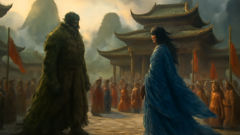Introduction
A gray sea stretched to the horizon, a sheet of unyielding water that swallowed the dawn. In a village of salt-smudged roofs and tired fishermen, news arrived like a gull on the wind: an imperial decree demanded passage across the eastern waters to a distant isle where a court ritual would be performed. Ordinary boats trembled at the thought of such a crossing. Waves were reported taller than pagodas, currents that braided like serpents, and a wind that carried whispers of old grudges. Yet where men feared and merchants hesitated, eight solitary figures gathered at the water’s rim, each known through the provinces by tales and tokens more than by face. They called themselves the Eight Immortals, not as a boast but as a description of the path they had each walked—their lives threaded with trials, transformations, and gifts that refused the ordinary pull of mortality. There was Lü Dongbin with his mountain-sanded sword and scholar’s quiet, He Xiangu carrying a lotus like a secret lamp, Zhang Guolao astride his strange donkey and accustomed to riding backward through time, Han Xiangzi with a petite flute that could unravel grief, Lan Caihe raucous and androgynous with a basket of strange blooms, Li Tieguai crutching on a gnarled staff and carrying a gourd whose contents obeyed their own laws, Zhongli Quan with a fan that could dissolve illusions, and Cao Guojiu in embroidered official robes whose stamp of dignity hid an artist’s heart. They stood a cluster of contrasting shapes—scholar, beggar, musician, official, healer, wanderer—and as they faced the sea that morning a hush fell over the villagers. Theirs was a reputation stitched from legends: they had healed the dying, chastened corrupt mandarins, and vanished from one village only to reappear in another with a saved soul in tow. None doubted their skill; what puzzled and delighted the onlookers was the variety of their methods. Where one sought to vanquish with force, another coaxed with music; where one cut through deception, another mended what had been torn. The decree required more than a spectacle: a demonstration of virtue and an offering that would stabilize a fragile treaty. Ships, supplies, and a handful of reluctant envoys waited. The port swelled with anxious faces as the immortals exchanged no grand plans—only glances that carried the quiet language of companions who had weathered storms together. Without delay they stepped into the surf, each with a talisman that had a story of its own, and the old sea prepared to reveal what it would become when the impossible approached. What followed was not a mere battle of magics but a lesson in how difference, properly aligned, can become the architecture of salvation. The tale that the villagers told afterward became a map of images: lanterns bobbing where waves should have been, a fan flicking away a storm’s anger, a flute stitching a seam across water. Over time the account braided into song and woodblock prints, into the hum of teahouse storytellers, and into the private meditations of those who remembered it as a parable of aid given and received. This is such a telling: long enough to hold the details, large enough to let each immortal breathe, and precise enough to honor the sea that tried them. It follows not only the outward crossing but the inward transformations that accompany any voyage across an element as fickle as the human heart.
The First Passage: Wits, Wind, and the Flute
The sea that morning was a living ledger of past wrongs. Dark ribs of water rose and fell, as if some giant hand turned the pages slowly and measured the cost of human deeds. The first challenge rose before the immortals had taken a single step: a wind unlike any the fishermen had seen—sharp, whistling at human bones, it pressed its palm against the shore as though to deny passage altogether. Boats that tried to push into that breath found themselves turned back as if struck by a wall. The air spoke in a tongue of its own, a lament woven with the names of things forgotten. Lü Dongbin stepped forward first, more by habit than by bravado. He was not a man of spectacle; his discipline lay in the patient honing of a sword that was as much a mirror as it was an instrument. For him the wind was a question: was it fright, was it guardian, or was it a beast clothed in weather? He answered not with violence but with the slow adjustment of a syllable. He set his sword across the surf like a plumb line, and then he arranged his breath with the same care. The sword sang when it met sun and salt, a note that threaded through the dunes and found the wind like a string finding a tuning peg. The gust staggered, then listened, and it is said that Lü could speak to storms as a scholar speaks to a stubborn student—firmly, with a wry insistence that would not permit ignorance to prevail. He explained to the wind the reasons they sought the passage: the ritual, the treaty, the handful of lives whose futures might turn on that crossing. But words alone rarely soothe an element; so Lü paired them with motion and music. He traced imaginary characters in the air, characters that were invitations rather than commands, and the wind, curious, leaned in. Once the breath of it had been met with reason, it relented enough for the first skiff to push through. Yet the greater threat lurked beneath: a current that eddied with malice and a blind undertow that devoured planks. Han Xiangzi, who carried his flute in a case of carved camphor wood, listened to that undertow differently. Where Lü addressed the wind, Han coaxed the water with notes that were not so much music as memory. He took the flute to his lips and breathed a melody like a lullaby for the ocean's darker parts. The tune was not ordinary—its intervals were tiny prayers, shaped to the rhythms of returning rather than conquest. The currents obeyed not because they were enchanted into obedience but because they recognized something familiar: the sound of a musician who had once played to mend a village roof torn by a typhoon, the echo of a song that had helped children out of fever. As Han’s melody wound over the waves, foam softened into crepe and the churning tongue of the current drew itself into calmer speech. The villagers who lined the cliffs held their breath and saw, in the space of breath, a miracle that was also a lesson; it required no single gesture of dominance, only the simple humility of attention. While Lü and Han engaged wind and wave with forms of address, He Xiangu moved like a visible prayer. Her lotus, which she carried sometimes as a walking stick and sometimes as a lamp, glowed with a gentle inner light. It did not shine like a lantern to force sight; instead it revealed paths previously invisible: ridges under water where rocks lay like teeth, shallow banks disguised by a film of disturbance. The lotus seemed to be in conversation with the sea in a dialect older than any human tongue. When she extended it, there was a hush and a clearing in the swells as if the ocean, too, appreciated beauty and was willing to part when asked with gentleness. It was He’s kindness that reminded the immortals—and the anxious onlookers—that courage can wear the face of care. Yet the crossing was not simply a series of individual feats; it was a choreography of small miracles stitched together by attention. Where Zan Guolao, who loved paradox and traveled on a donkey he could fold like an accordion, chose to test the limits of endurance, Lan Caihe offered a trick that was equal parts satire and wisdom. Lan walked along the edge of the shore scattering flowers from a wicker basket that never emptied. Each blossom, when it struck a wave, turned into a small stepping stone of light. These flowers were not tricks of the eye but offerings of perspective: they reminded the water of dry things—meadows, bees, and the softness of soil. They invited the sea, in its own way, to remember gentler cycles. Together, these deeds began to dismantle the first barrier: the furious greeting of wind and current. Not through domination, but through vocabulary—song, blade-syllables, petals, light, and the steady presence of those who had perfected different arts. Yet another test waited beyond the ribbon of calmed water: a sudden region where rocks lay like the teeth of a submerged dragon, jagged and treacherous. Boats might strike and splinter. It required a map, or perhaps a mind that could translate land into safe passage. Zhang Guolao, whose donkey had the curious habit of carrying memories rather than weight, took his seat and began to hum a rhythm that coaxed memory out of the gulls. Birds had flown this coast for centuries and borne secrets between headlands and shoals. Zhang’s song, half nonsense and half genealogy, called the gulls into a pattern, and they traced in the sky an unwritten chart that shadowed a path between teeth and reef. Li Tieguai approached a different problem with a different law. His gourd, dented and patched, contained energies that shifted like weather. When necessary, he uncorked it and released a mist that was not a cloud but a practical friend—an air that buoyed and that filled small crafts with a gentle upward pressure, keeping hulls off the worst of the coral. Cao Guojiu, whose official seals had once bound him to a world of court duties, unfolded a ribbon of embroidered cloth that deterred petty tempests: the cloth sang an austere bureaucratic command that the weather recognized as a form of social order. Zhongli Quan, with laughter and the wave of a fan, dissolved illusion and mended fear. Sometimes the sea hides itself with tricks to punish human conceit; Zhongli’s gift was to reveal that what looks monstrous is often only a mirror of human worry. He would fan, and the sea would show its honest face. Each action was small in itself, but together the immortals threaded a path as deliberate as the embroidery on Cao’s robe. The crossing did not happen cleanly. There were missteps and moments when a skiff would dip too low, a gull would scatter and take with it Zhang’s navigational hint, and a bruise of salt would sting an immortal’s eye. Yet conversation remained the method of remedy: a whispered counsel, a gesture, a tight laugh between friends. In the longest hour the villagers watched the eight figures move like a vanishing constellation and realized that magic in this story was a form of mutual intelligence. The sea, which had seemed intent on refusing their passage, found itself conversing with a more versatile intelligence than it had met before. When the last boat skimmed into the sheltered channel, the sky had shifted to a thin, metallic blue. Success, when it came, was not a shout but a soft, satisfied exhale that seemed to float from water to horizon and back again. The immortals had not simply crossed a physical barrier; they had demonstrated a practice of reciprocity—an idea that would be carved into woodblocks and sewn into the edges of later stories: meet the force of nature not with arrogance, but with the particular gifts you have honed, and discover how those gifts can be offered as part of a larger conversation.

The Heart of the Sea: Lessons in Reciprocity and Renewal
Beyond the treacherous teeth of hidden reefs the sea revealed a new temperament: a melancholy so deep it felt like a physical thing, a cold that entered the bones. The boats that had made the initial passage nosed into a region where fog lay heavy and every sound was half-carried and half-lost. Here the sea hid its center, a hollow that had known grief—grief for those who had been lost to storms, for coastal villages swept by sudden tides, for fishermen whose names had never been sung again. The immortals, who had already practiced patience, tightened their circle. It is easy to go through challenges that allow for cleverness; the harder test comes when one must face sorrow with dignity. He Xiangu, who had already guided them with a lotus, now moved among the skiffs like a midwife of consolation. She unrolled a series of small cloths from her lotus case, each embroidered with blessings for those who had drowned and for the living left behind. She draped these cloths along the rails and sang quietly—her voice had the patient cadence of someone who had learned to keep vigil for the afflicted. Her action did more than offer comfort; it altered the tone of the water, which seemed to hear in the thread of her song a recognition that its old list of grievances could be mourned and then laid aside. It was as if the sea had been holding grief in a clenched fist, and He’s gentle acknowledgment encouraged it to open. Li Tieguai then performed what some called a comic miracle. He limped along the boats, his crutch tapping the planks with a rhythm that slowed even the breathiest clams of the fog. From his gourd he poured a small draught—a tincture that smelled of earth and smoked tea—into the air. The scent was odd, like a home-cooked soup after a long exile, and it brought with it a memory of family kitchens, of hands full of food and faces lit with gossip and scolding. That memory, simple and stubborn, dressed the fog in the texture of human warmth. Li’s medicine did not drive the sorrow away; rather, it gave the sea a human anchor, a reminder that people could hold grief without being erased by it. While the sea learned how to hold its feelings, the immortals had to navigate not only topography but social obligations. Cao Guojiu, ever mindful of rites and decorum, reminded them of the treaty’s urgency. It was one thing to cross; it was another to arrive in a manner befitting the ceremony. He arranged the robes of the envoys and straightened curtains as if preparing a court. His hands, which had signed edicts that changed lives, now folded cloth and smoothed furrows of worry. His service was humble: attend to form so that the deeper moral work could be recognized by those in power. It is an easy mistake to think Cao’s work trivial; in a world that honors ritual, the manner of arrival can determine whether goodwill survives contact with bureaucracy. Zhongli Quan, who sometimes laughed until his own eyes filled, took a different tack. He recognized that in every place there is a story that the land tells itself, a fiction that must be undone before practical work can proceed. With his fan, he dispelled illusions—mistaken assumptions about the sea’s hostility or men’s cowardice. A wave that appeared monstrous and sudden might have been a simple trapped wind refracted by the fog; a dangerous shoal might have been a shifting play of shadow. Zhongli’s humor was his most practical tool; by transforming what was feared into something recognizably human, he freed his companions from the paralysis that fear can cause. The deeper lesson was that compassion mixed with clear sight can make a passage possible. Zhang Guolao, who loved contradictions, used the fog’s hiding to his advantage. He instructed his donkey to fold into a box and then unfold again, a maneuver that caused the craft behind him to mirror the action in a spontaneous chain of laughter. Laughter, contagious and irreverent, is a kind of wind in itself—it moves, it refreshes, and it breaks the grip of dread. In a place where silence had a weight, laughter became a lever. Lan Caihe, who wore clothing patched from many seasons and sang uncertain rhymes, tossed flowers again—this time not to make stepping stones of light but to invite the sea to remember the ephemeral pleasures that soften even the deepest sorrow. The flowers landed in the fog and, for a moment, a scent of old spring returned to the world, as if a secret garden had been re-opened. That scent worked like a promise and lifted a layer from the water’s face. As these small acts accumulated they did something unexpected: they invited the sea into a human conversation about loss and return. The sea, which had been a guardian of graves and secrets, found itself feeling seen. And being seen changed the terms of engagement. It asked for nothing dramatic in return—no sacrifice of blood or life—but it wanted acknowledgment and remembrance. The immortals obliged, and in doing so they taught those who observed them that reciprocity is not a ledger of equal trades but a practice of recognition. When they finally reached the island’s shadow, the air cleared and light poured like a benediction. The rite was performed with a solemnity that suited the place: offerings set on polished stones, incense that threaded upward in thin, respectful coils, and words spoken as if they were seeds. The envoys kept their faces composed, but in their eyes there was a film of astonished respect. Because the immortals had not stormed the island, they did not triumph in the usual sense. Their success was quieter and more durable: the treaty would be honored because its carriers had arrived with a proof that different arts of survival could be aligned in service of the public good. The islanders received them with a mixture of relief and awe, and the story traveled home, altering accounts of heroism. Later, in teahouses and festival squares, the tale of the crossing was told and re-told, not as a simple account of supernatural prowess but as a composition of small civic actions: tending to sorrow, offering practical warmth, dispelling illusions, and remembering to laugh. These were the acts that stitched a world together. The sea itself, for a time, seemed to keep a quieter coastline. Fishermen reported calmer currents and a clarity of water near the place where the immortals had passed. Whether this was a lasting change or a seasonal mercy was not the point; people learned that the right mixture of gifts—music, humor, mercy, ceremony—could make the world more livable. In the years that followed, artisans carved scenes from the crossing into panels of lacquer and ivory, each featuring a different immortal and a different method of crossing. Parents used the story to teach children the virtues of listening and of bringing what one has to the service of others. What the immortals had done was not to declare themselves rulers of the sea but to model a craft of attention: a way of facing the large and terrible things without presuming to erase them, and a way of shaping small acts into a map for many to travel.

Conclusion
The return from the island was quieter than the crossing had been. There were no new miracles, only the slow work of putting things back in their places: the envoys thanked the immortals with gifts that were modest and generous—a chest of preserved tea, a scroll of calligraphy, a promise to remember the ceremony with proper honors. The immortals accepted without ostentation, for that was their way; gifts in their world were measures of mutual regard rather than trophies. Back on the shore the villagers received them with songs and a feast that smelled of braised fish and citrus. Children pressed close to hear the details, and elders nodded as though the story had always been part of the coastline’s history. Over the following months the crossing entered the language of the community: neighbors spoke of “crossing our personal seas” when mending a dispute, and merchants used the image to name boats that had weathered storms. Craftsmen carved new woodblocks depicting each immortal in the act that had saved the passage, and those prints traveled to markets beyond the county. Some took to wearing small talismans that portrayed a lotus, a flute, a fan, or a gourd—reminders that different tools, when shared, make the world more navigable. The immortals themselves dispersed after the ripple of events, each resuming the paths that had defined them: Lü returned to his mountain walks and his brief, instructive interventions; Han wandered the temples and markets, his music softening funerals and festivals alike; He tended small gardens and tended to grief with tea and quiet words; Zhang performed his playful paradoxes in market squares; Lan kept to the roads and gave flowers to those who needed them; Li made a slow circuit among the poor, offering practical cures and jokes; Cao recorded sensible reforms; Zhongli amused himself by dissolving an illusion or two for those overly attached to their own importance. The sea, for its part, did not become a tamed thing. Tides continued, storms returned, new tragedies unfolded. But the passage left a track in human memory, one that testified not to singular puissance but to a communal intelligence where differing strengths could be joined without losing their particularity. Travelers who later found themselves before difficult waters often spoke the names of the immortals as if invoking a practical prayer: “May Lü’s steadiness meet the wind; may Han’s melody find the current.” The tale endured because it described a habit worth repeating: bring what you are, not what you are not; do not pretend to solve every problem by force, and value the quiet arts of consolation and humor as much as dramatic intervention. In this way the crossing remained more than an episode of supernatural daring; it became a model for civic life. The story traveled across provinces and eras, taking on the pigments of its listeners—sometimes a stern moral, sometimes a comic sketch, sometimes the subject of a dramatic opera. But through all variations a single contour remained clear: crossing a sea invites many competencies, and when those competencies gather in friendship they can change the weather of a community. That is why every telling matters: it reminds us that the world is not a place that asks for one kind of hero but for many, joined, who lend one another wings, flutes, fans, and patience.


















